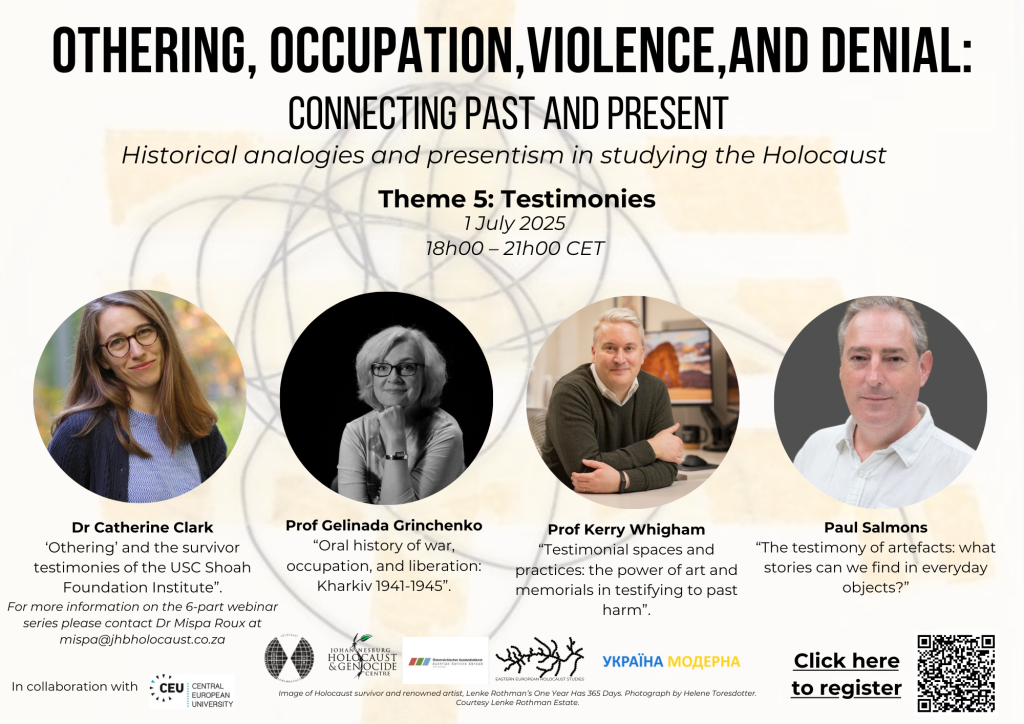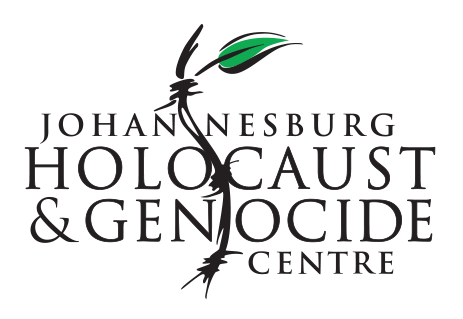1 July 2025 @ 6:00 pm – 9:00 pm

Join us for the IHRA Webinar Series, in collaboration with the Johannesburg Holocaust & Genocide Centre (JHGC), Eastern European Holocaust Studies: Interdisciplinary Journal of the Babyn Yar Holocaust Memorial Center (EEHS), Ukraina Moderna website (UM), and Austrian Service Abroad (ASA) on the theme of “Othering, Occupation, Violence, and Denial”. Topics that will be engaged with under the central theme include the way in which historical analogies and presentism in studying the history of the Holocaust are used to foster deeper understanding and critical thinking about the Holocaust, current armed conflicts and the rise of hate speech. Ways in which oversimplifications, misrepresentations, distortions, and denial of these topics can be challenged and safeguarded against will also be grappled with, alongside testimonies, resistance, education, remembrance, and the collection and preservation of history.
This fifth webinar in the series deals with the theme of Testimonies featuring speakers: Dr Catherine Clark on “‘Othering’ and the Survivor Testimonies of the USC Shoah Foundation Institute”, Prof Gelinada Grinchenko on “Oral history of war, occupation, and liberation: Kharkiv 1941-1945”, Prof Kerry Whigham on “Testimonial spaces and practices: the power of art and memorials in testifying to past harm”, and Paul Salmons on “The testimony of artefacts: what stories can we find in everyday objects?”
Catherine E. Clark, PhD, is the Senior Director of Programs at the USC Shoah Foundation. Trained as a historian of modern Europe, Clark joined the Shoah Foundation in 2024 after serving at MIT, where she remains a tenured Associate Professor of History and French Studies. From 2022-2024, she served as the Faculty Director of MIT’s Programs in the Digital Humanities. Clark is the author of Paris and the Cliché of History (Oxford University Press, 2018), which won the 2018-2019 Laurence Wylie Prize for the best book in French cultural studies authored by a resident of North America, as well as numerous articles about French history and culture in publications including the American Historical Review, the Journal of Visual Culture, and Representations. She brings her expertise in history, visual culture, and computational methods in the Humanities to her role at the USC Shoah Foundation. Clark is dedicated to strengthening the Institute’s educational, academic, and public programs and fostering impactful partnerships.
Prof. Dr. Gelinada Grinchenko is an Associated Researcher at the Mykola Haievoi Center for Modern History at Ludwig Maximilian University of Munich, Germany, and a Professor at the Department of World History at Oles Honchar Dnipro National University, Ukraine (until 2023, she was a Professor at the Department of Ukrainian Studies at V. N. Karazin Kharkiv National University, Ukraine). She is also the Editor-in-Chief of the peer-reviewed journal Ukraina Moderna, Co-Chair of the German-Ukrainian Historical Commission, and Co-Chair of the Ukrainian Oral History Association. Her research interests include Oral History, the history and remembrance of World War II, Memory Studies, and Holocaust and genocide research. She is the author of numerous publications on these topics, including: Reclaiming the Personal: Oral History in Post-Socialist Europe, edited by N. Khanenko-Friesen and G. Grinchenko, University of Toronto Press, Scholarly Publishing Division, 2015,Traitors, Collaborators, and Deserters in Contemporary European Politics of Memory: Formulas of Betrayal, edited by G. Grinchenko and E. Narvselius, Palgrave Macmillan Memory Studies, 2018, and Grinchenko, Gelinada; Venger, Albert (2024): Archival Case Files Regarding the Killings of Psychiatric Hospital Patients in Occupied Dnipropetrovs’k Region: Historical Sources, People, and Memory (in Ukrainian). She has taught as a Visiting Professor at Bochum and Giessen Universities (Germany) and was a fellow at numerous foundations and institutions, including: Alexander-von-Humboldt-Stiftung, Philipp Schwartz Initiative for At-Risk-Scholars (2023–24), Konrad-Adenauer-Stiftung (2022, 2023), Canadian Institute of Ukrainian Studies (2022, 2021, 2006, 2004), Imre Kertész Kolleg Jena (2019–20), Center for Holocaust Studies at the Institute for Contemporary History in Munich (2018), The Hadassah-Brandeis Institute and the Brandeis-Genesis Institute for Russian Jewry, Brandeis University, USA (2015), Gerda Henkel Stiftung (2012, 2004–06), The Center for Advanced Study and Education (2010, 2009), and the American Council of Learned Societies (2008, 2003).
Kerry Whigham is Assistant Professor of Genocide and Mass Atrocity Prevention at Binghamton University and Co-Director of its Institute for Genocide and Mass Atrocity Prevention (I-GMAP). His first book, Resonant Violence: Affect, Memory, and Activism in Post-Genocide Societies, is published by Rutgers University Press. He has also published articles in Genocide Studies and Prevention, Memory Studies, Public Administration Review, Public Administration and Development, and The International Journal of Transitional Justice, and has written chapters for several edited volumes. He served as a Fulbright Specialist at UNESCO and regularly trains government agencies on atrocity prevention policy and practice. He received a Ph.D. in Performance Studies from New York University. In addition to his academic work, he is the Director of Research and Online Education at the Auschwitz Institute for the Prevention of Genocide and Mass Atrocities, an international non-governmental organisation that works with over 90 countries around the world on creating public policy for the protection of vulnerable groups and the prevention of mass atrocities.
Paul Salmons specialises in difficult, challenging histories, exploring the continued relevance of the past in today’s complex world. He is Director of the exhibition and education company, Paul Salmons Associates, Chief Curator of the travelling exhibition, Seeing Auschwitz (produced by Musealia for UNESCO and the United Nations), and co-curator of Musealia’s international award-winning Auschwitz. Not long ago. Not far away. He was consulting curator on two new permanent Holocaust exhibitions in New York City and St Louis, Missouri, and helped to create the major new international travelling exhibition The Berlin Wall: Living in a Divided World, currently on display in Paris. Previously, Paul helped create the United Kingdom’s national Holocaust Exhibition at the Imperial War Museum; co-founded the Centre for Holocaust Education at University College London; and for 20 years played a leading role in the International Holocaust Remembrance Alliance. He is also the United States Holocaust Memorial Museum’s first Leslie and Susan Gonda (Goldschmied) Fellow, contributing to a range of the Museum’s international and educational projects.

